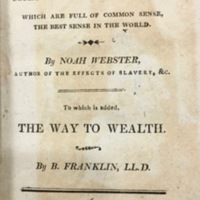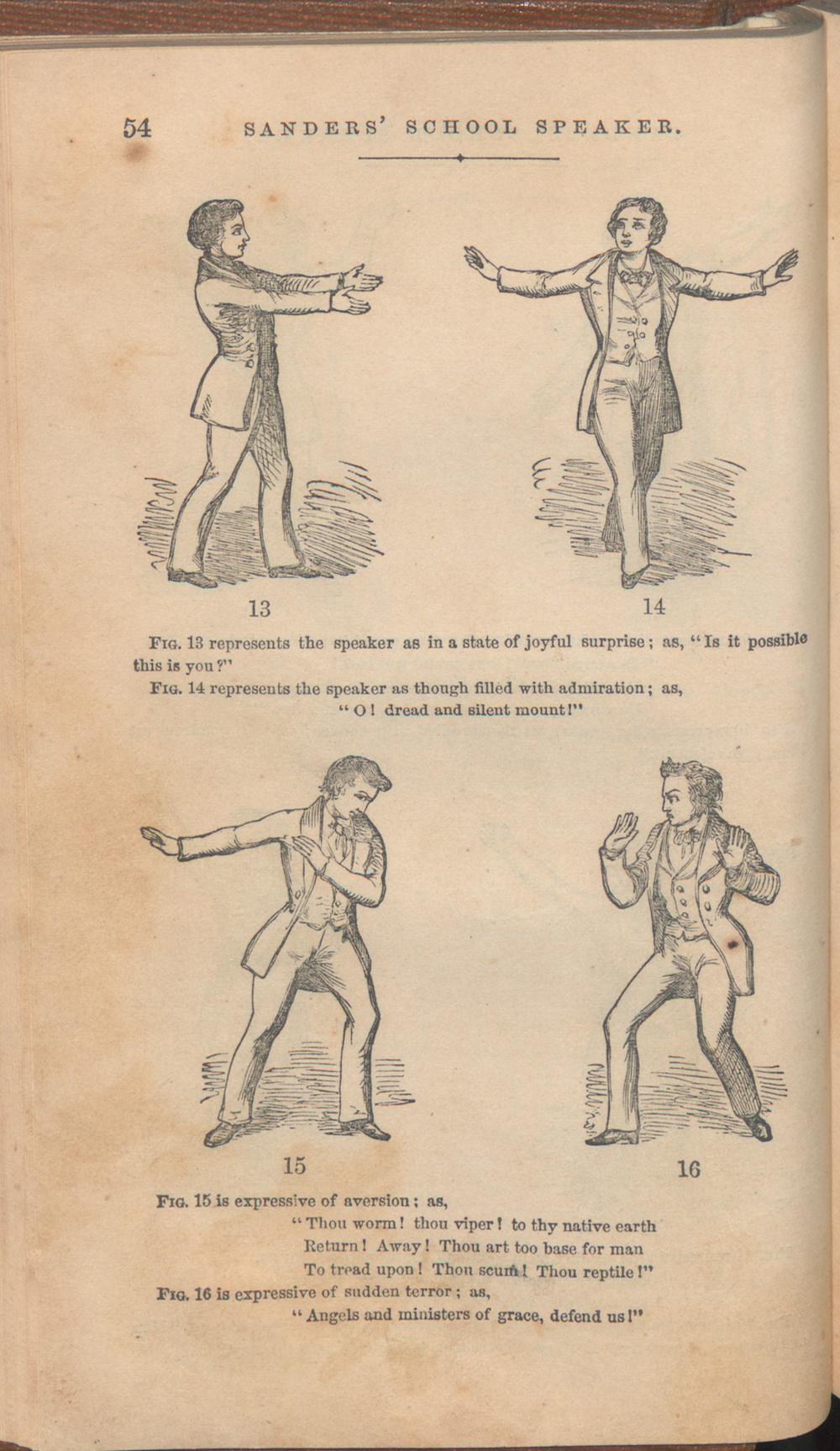Browse Exhibits (2 total)
The Prompter

In The Prompter; or Common Sayings, and Subjects, Which are Full of Common Sense, the Best Sense in the World, Noah Webster uses a collections of sayings, phrases, and proverbs to offer readers common sense advice.
One such phrase is "The Under-Lip." Throughout this passage, Webster writes about the incompetence of those with under-lips, warning readers against hiring or electing a person with an under-lip.
Noah Knows Best: Morality Judgments and 19th-Century Language Usage

Noah Webster's The Elementary Spelling Book; Being an Improvement on the American Spelling Book is an illuminating text for understanding 19th-century language ideologies. When we think of the time period in which this piece emerged, we imagine, on the one hand, westward expansion and new growth for the budding economy of the United States; on the other hand, the displacing and murdering of large groups of people, and decisions about who was "right" or "wrong" – especially when anyone got in the way of the precious dream of American prosperity. It was in this period, 1835 to be precise, that Noah Webster added another book to his growing collection of American English dictionaries, spelling books, and pronunciation guides, as part of a widespread attempt to achieve "uniformity" in American English speech and writing. As we know from Thomas Paul Bonfiglio, the use of morality as a justification for certain language rules and reforms was common during the era, and across time in general. Diving into The Elementary Spelling Book, this is not only evident but obvious, as Webster makes no attempt to hide the fact that language usage and morality are inextricably linked in his mind.
By looking at the historical context in which The Elementary Spelling Book was written, we find the narrating event of the text. Webster is largely addressing the community of those like him: the "gentlemen" who want to see one homogenous English language (at least within, but perhaps beyond too, the United States). Yet, as we see as early as the first page of front matter after the title page, Webster has an additional audience in mind: “the foreigner.” The U.S. was just beginning to see new waves of immigrants from Western Europe, which would only increase in size in the coming decades. Also to come were large numbers of Chinese immigrants, a few years later in the California gold rush. Webster, a New Englander of pure English descent, could have been referring to any number of these groups as the "foreigner" he wished to educate. The conversation, then, is between Webster, other men like him, and (perhaps on the sidelines) the outsider who wishes to become a part of American culture. Whether or not these assimilation-desiring outsiders really existed, or whether Webster's dream of converting the non-pure non-Anglo Saxon man to his way of thinking, speaking, and being was completely a fantasy on his part, is unknown. In the case that this unknown Other does exist and participate in the dialogue, it is without question that Webster and his contemporaries are on one side of the conversation, while the foreigners are on the outside looking in. Thus, while not blatantly alienating the foreigner or using him as a a device to point out linguistic flaws as other writers of the time did, Webster is certainly not expecting the foreigner to be his primary readership; he is simply forming an alliance between himself and other native English speakers against which to position the Other. Starting off with an indexical alignment and opposition like this sets the scene for what is to come.
Within this text, one can find a number of tidbits of ideological data of the time. Each of these can be described as a narrated event, in which some claim is made that then adds to the overall social action being accomplished. Most of the segments of interest come from the preface, as the actual body of the text is much less marked than the paratextual elements in terms of blatant ideological claims.
The first narrated event to note is Webster’s initial claim that the pronunciation found in his book is “in exact accordance with the best usage both in England and the United States” (5). Such a claim is striking for two reasons: first, Webster is implying that English pronunciation in the United States and England are similar enough that the “best” usage of both regions is actual the same dialect, and second, Webster is introducing the idea that his book holds the key to “good” pronunciation. The first claim is simply historically inaccurate, but the second at least merits further discussion. On the same page, Webster contributes to this narrated event another claim, one that I take to be perhaps the most important of the whole book: “The pronunciation here given, is that which is sanctioned by the most general usage of well-bred people both in the United States and in England. This fact is stated from personal knowledge” (5). It is here that we can see how outrageous Webster’s point of view truly is. Not only does he associate “good” pronunciation with “well-bred people” (not a terribly surprising thing to say at the time, or even nowadays), but he also has no factual basis for this idea – he explicitly tells us that this “fact” comes “from personal knowledge”! (Such a phrase makes our 2019 discourse about “alternative facts” seem slightly less frightening.) Keeping in mind the source of Noah’s information helps one to keep perspective while continuing to read this book.
On the next page, Webster describes in detail an example of “bad” pronunciation, using strong language to characterize it as such. He takes particular issue with the pronunciation of “u as yu” which results in the pronunciation of [d] as [dʒ] or [t] as [tʃ], as in gradual and nature. A fairly simple assimilation effect resulting from the articulation of an alveolar plosive before a high vowel (which he in fact describes as a normal process just a few pages later in the case of patience and nation), the palatalization of these consonants is rather common cross-linguistically, and should not be seen as a major crisis. Webster’s reaction, however, would lead one to believe otherwise. “The mischiefs resulting from this affectation,” he says, “in changing the proper sounds of the letters, and thus impairing the use of the alphabet, have been very extensive, and cannot be easily repaired” (6). Already, he is designating the pronunciation as causing “mischief” and “impairing” the language. It is apparently causing irreparable damage, as well. However, he continues thus: “But the good sense of the intelligent part of the British public has, in some degree, checked the evil” (6). So though it may not be “easily” repaired, it can be stopped in its tracks, if one uses “good sense,” and moreover, if one is “intelligent.” The pinacle of the comment the final word here: evil. If it was not yet clear that Webster aligns good language with moral goodness, it is now unmistakable.
A third narrated event is found in Webster’s comparison of his book to a religious text like the Bible. Prior to actually stating the claim, though, he gives another observation that cannot be overlooked: the fact that language spread may contribute to the spread of religion. Webster hopes this book will “fix the pronunciation of words, facilitate the acquisition of it both by foreigners and our own children, and probably contribute to the propagation of the English language, and of christianity among distant nations” (6). Here citing a direct correlation between the propagation of the English language and the christianization of those populations to whom it spreads, Webster is very clearly connecting morality and religious holiness to proper use of language – and not just any language, for that matter, but the English language as it is described in this book. This makes his comment at the end of the preface more telling, as he calls this text “the most important class-book, not of a religious character, which the youth of our country are destined to use” (7). Another blatantly direct comparison, in this case, Webster likens his book to the most important book children can read – presumably, the Bible. After the Bible and other religious texts comes The Elementary Spelling Book in terms of importance to a child’s education. The self-importance which Noah accords himself is truly discomfiting.
Finally, at the conclusion of his explanations of different typological conventions and punctuation marks, Webster launches, out of nowhere, into a pseudo-religious and paternalistic diatribe with little to do with the rest of the book. Beginning with “Hear, ye children, the instruction of a father, and attend to know understanding,” delving into a flowery and abstruse tale of how the earth will come to an end, and ending with “Let us hear the conclusion of the whole matter: Fear God and keep his commandments, for this is the whole duty of man. For God shall bring every work into judgment, with every secret thing, whether it be good, or whether it be evil,” Noah truly outdoes himself in terms of the lengths he will go to in order to show language as inherently related to morality. After seeing his comparison of this text to a religious work, it is not surprising that Webster closes the book with an evangelical harangue attempting to proselytize his readers, if not to be better Christians, at least to speak his version of English. Such is ultimately the social work accomplished by this text: to attempt to “convert” his readers to his side – the side of “proper” English – by demonstrating that being a good speaker of English is necessarily tied to being a good Christian, a good American citizen, and a good person.
To find a cross-event linkage with another text in our collection, one must look no further than the book to which this one is a response: The American Spelling Book Containing the Rudiments of the English Language, published in 1829. While any of Webster’s works can be seen as linked to the speech event described above, it is this one that is of particular interest, since the subtitle of The Elementary Spelling Book is Being an Improvement on the American Spelling Book. Why he sees the latter as an improvement is not clear, and in fact the content of the two is quite different, aside from both being, technically, spelling books. In the first version, Webster intersperses his spelling guidelines with completely unrelated topics, such as “precepts concerning the social relations,” in which he explains how to behave in society depending on one’s identity and relation to the identities of others. Although there are no explicit social instructions in the second book, the ideological underpining is apparent: there is a linkage between proper speech and proper social comportment, which we can assume then carries over to proper morality, as seen in the language used by Webster to describe good language in The Elementary Spelling Book. The religious backing that underlies much of The Elementary Spelling Book is no stranger to him in The American Spelling Book, as he declares in one example of social instructions that the one vice that lies “above all” is to be “a scoffer at religion” (81). Furthermore, when explaining how children should behave, he recommends: “Hear the words of thy father, for they are spoken for thy good” (82), a sentence that sounds all too familiar if one has just read the concluding sermon of The Elementary Spelling Book, which thus begs the question: does Noah Webster see himself as a father figure to his readers – or even a father of proper American English speech? Reading into the underlying opinions behind Webster’s instructional texts provides insight into a vast window of knowledge of the time, and of the author himself. It is for this reason that one can make a clear cross-event linkage between these two texts.
